

DAN ALLEN. Occupying Post-Collapse America: What if the industrial death-urge lived on? As economic growth fails how do we live? Part I: The four horsemen of the economic apocalypse. As recently as a year ago it was considered heresy to suggest economic growth would not soon resume.
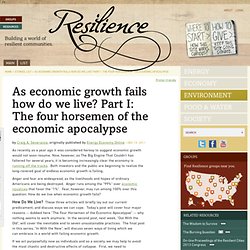
Now, however, as The Big Engine That Couldn't has faltered for several years, it is becoming increasingly clear the economy is running off the tracks. Both investors and the public are beginning to realize the long-revered goal of endless economic growth is failing. Anger and fear are widespread, as the livelihoods and hopes of ordinary Americans are being destroyed.
A conversation with Dmitry Orlov about Europe. [Première publication sur Orbite.info: Un entretien avec Dmitry Orlov] I came upon Dmitry Orlov's writings—as with most good things on the Internet—by letting chance and curiosity guide me from link to link.
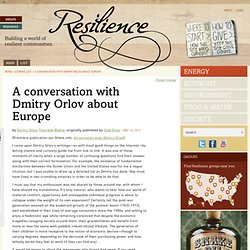
It was one of those moments of clarity when a large number of confusing questions find their answer along with their correct formulation. For example, the existence of fundamental similarities between the Soviet Union and the United States was for me a vague intuition, but I was unable to draw up a detailed list as Dmitry has done. One must have lived in two crumbling empires in order to be able to do that. Axialization. Welcome to Armageddon, USA: A Tour of America’s Most Toxic Town. Larry Roberts angles his white Mercury Grand Marquis into the empty parking lot of a tiny café, G & J’s Gorillas Cage, and cruises into a space near the front door.
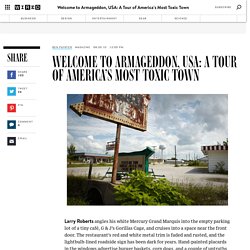
The restaurant’s red and white metal trim is faded and rusted, and the lightbulb-lined roadside sign has been dark for years. The Net Energy of Pre-Industrial Agriculture. Following on from yesterday's discussion, I want to make a point that seems like it must have been made before, but I cannot quickly find a good discussion of it.
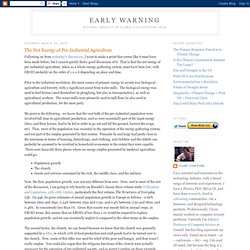
That is that the net energy of pre-industrial agriculture, taken as a whole energy-gathering system, must have been low, with EROEI probably on the order of 1.1-1.6 depending on place and time. Prior to the industrial revolution, the main source of primary energy in society was biological - agriculture and forestry, with a significant assist from water mills. The biological energy was used to feed horses (used themselves in ploughing, but also in transportation), as well as agricultural workers. The Energy Return on Investment Threshold. We must first realize that EROI is a somewhat theoretical concept; it is a unitless ratio that does not describe actual flows of energy.
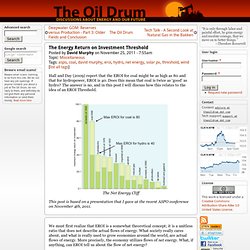
What society really cares about, and what is really used to grow economies around the world, are actual flows of energy. More precisely, the economy utilizes flows of net energy. Atemporality for the Creative Artist. *An unrepentant sympathizer took the trouble to type up a full transcript of my speech at Transmediale 10 on February 6.
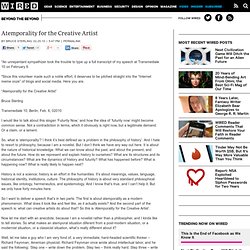
*Since this volunteer made such a noble effort, it deserves to be pitched straight into the “Internet meme ooze” of blogs and social media. Here you are. “Atemporality for the Creative Artist” Bruce Sterling Transmediale 10, Berlin, Feb. 6, 02010. Bringing It Down To Earth. We’ve covered a lot of ground in the last two months or so, and at this point I want to summarize the territory thus explored and link it back into the core of this blog’s project—the search for a realistic understanding of the troubled future ahead of us, and a meaningful way to respond to it.

One crucial part of that response, I’ve suggested, relates to that tangled realm where consciousness meets the unconscious drives that shape so much of our experience of the world: a realm that contemporary thought addresses, however incompletely, through the science of psychology, and that the older lore of magic approaches in a much more comprehensive and potent way. That latter lore is only one part of the toolkit we’re going to need to deal with the storms to come, but it’s an important part, and it’s well suited to deal with issues most of today’s proposals for the future leave unanswered. An effective response to this predicament, as I’ve proposed here, involves several unfamiliar steps. The myth of renewable energy. "Clean.
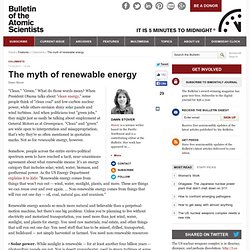
" "Green. " What do those words mean? Death Squared ☠^2 « GardenSERF's Plot. Res Politica versus Res Economica. Today’s Outside the Box is the latest chapter in my ongoing discussion with Dr.
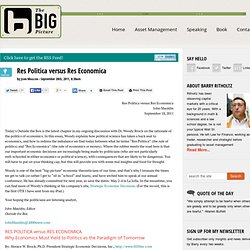
Woody Brock on the rationale of the politics of economics. In this essay, Woody explains how political science has taken a back seat to economics, and how to redress the imbalance we find today between what he terms “Res Politica” (the rule of politics) and “Res Economica” (the rule of economics or money). Where the rubber meets the road here is that our important economic decisions are increasingly being made by politicians (who are not particularly well-schooled in either economics or political science), with consequences that are likely to be dangerous.
You will have to put on your thinking cap, but this will provide you with some real insights and food for thought. ClubOrlov. Hubbert's Third Prophecy. [A timely guest post from Gary. tl;dn: Hubbert was right. Again.] In light of recent events such as the Arab Spring and Occupy Wall Street I thought it would be pertinent to review Hubbert's Third Prophecy about the cultural crisis he expected. He wrote about it in the attached article entitled "Exponential Growth as a Transient Phenomenon in Human History". Illusions of Democracy - Esther Dyson. Exit from comment view mode.
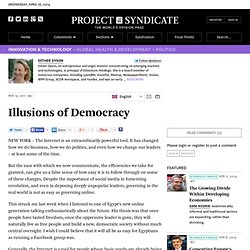
Click to hide this space NEW YORK – The Internet is an extraordinarily powerful tool. It has changed how we do business, how we do politics, and even how we change our leaders – at least some of the time. But the ease with which we now communicate, the efficiencies we take for granted, can give us a false sense of how easy it is to follow through on some of these changes.
Collapse could happen, literally, overnight. If all our debit cards stopped working suddenly, it could crash the economy. Photo: justDONQUE.images via Flickr. In the granddaddy of all collapse books, The History of the Decline and Fall of the Roman Empire, 18th-century historian Edward Gibbon gave ancient Rome a full 500 years to deflate. How the U.S. Is Becoming a 3rd World Country - Part 1. The United States is increasingly similar to a 3rd world country in several ways and is accelerating towards 3rd world status. Economic data indicate a harsh reality that obviates mainstream political debate. The evidence suggests that, without fundamental reforms, the U.S. will become a post industrial neo-3rd-world country by 2032. Fundamental characteristics that define a 3rd world country include high unemployment, lack of economic opportunity, low wages, widespread poverty, extreme concentration of wealth, unsustainable government debt, control of the government by international banks and multinational corporations, weak rule of law and counterproductive government policies.
All of these characteristics are evident in the U.S. today. Other factors include poor public health, nutrition and education, as well as lack of infrastructure. P2P and Utopia: the values of the new civilization. Preparing for Civilization’s End. The first edition of Shift Magazine, which is all about building resilience for a tumultuous future, and of which I am and will be a regular contributor (writing a trilogy on complexity and then some joyous short stories set two millennia from now), is now available for subscription, online viewing and (for the time being) free download. I’m thrilled to be working on theme-based editions of this edgy, unsentimental but upbeat, youth-oriented publication alongside the likes of fellow ‘collapsniks’ Guy McPherson, Carolyn Baker and Generation Alpha’s Ben Pennings. Please check it out, talk about it, and tell us what you think. cartoon by Australian cartoonist Michael Leunig As this winter (and summer in the Southern hemisphere) of extreme weather and record-setting temperatures and precipitation (at both ends of the scales) rolls on, I am sensing a significant shift in the thinking of people who are reasonably informed about what’s going on in the world.
Managing Without Growth and the Economics of Flow. Can we have post-peak oil thrivable societies? Juliet Schor: Plenitude#more-20661. The only real wealth is cultural wealth. The golden globes of the planetary commons. Video: Paul Krugman's "Vision for a Decent Society" The End of the American Era. Jeremy Rifkin on the real nature of our triple crisis: peak globalization, peak oil, and 3 degrees climate change.
The Depreciation of Care at Home. Niall Ferguson does not know what "Western Civilization" means. Population, Resources, and Investments. In one of his first-ever articles for Energy & Capital, Chris Nelder asked, “Are Humans Smarter than Yeast?” The question stems from research done by Dr. Financial Crisis, Economic Crisis, Debt Crisis: What's next. In my previous article, “Global Economic Crisis: Recovering from a Tailspin,” I hinted towards how the economy can grow in order to pay back the increased government spending. Since then, multiple stimulus programs went into full gear (Troubled Asset Relief Program, American Recovery and Reinvestment Act, etc.) creating liquidity, or in other words, injecting cash into various institutions, or making cash available for credit.
America: Excelling at Mediocrity - Umair Haque. By Umair Haque | 2:26 PM October 28, 2011. Unified Quest. Debtpocalyse: Army Futurists See Fiscal Meltdown on the Horizon. Critique of the scarcity-paradigm of western conservationists in the South. The Decline of Manufacturing in America: A Case Study. What is Debt? – An Interview with Economic Anthropologist David Graeber. Michael Hudson: The State and Local Budget Crisis. John Michael Greer on Resilience vs Efficiency. Sachs: The Great Failure of Globalization. Obsolete Expertise and the US Economy's Energy Problem. A Planetary Crisis Is A Terrible Thing to Waste by Christian Schwägerl.
Providing a wide view of what may be ahead. It will not be a problem to feed 15 billion people. How to save the world. World power swings back to America. Macro-Historical Revolutions. The capitalist network that runs the world - physics-math - 19 October 2011. Thomas P.M. Barnett's Globlogization - Blog. The scary prospect of global drone warfare. Climate Change May Trap Hundreds Of Millions In Disaster Zones. Gregor.us. Central Planning and The Fall of the US Empire.